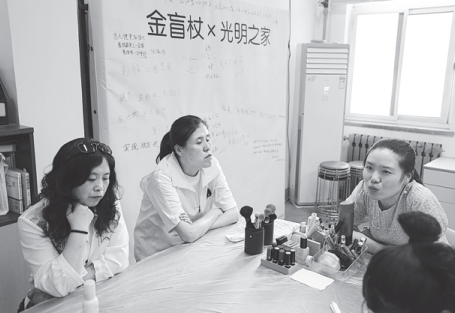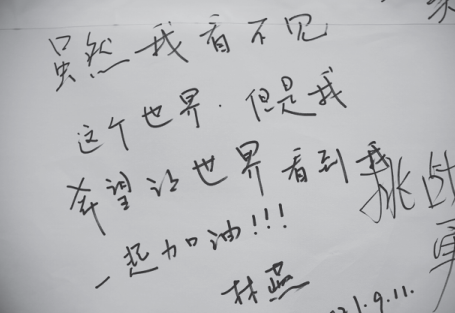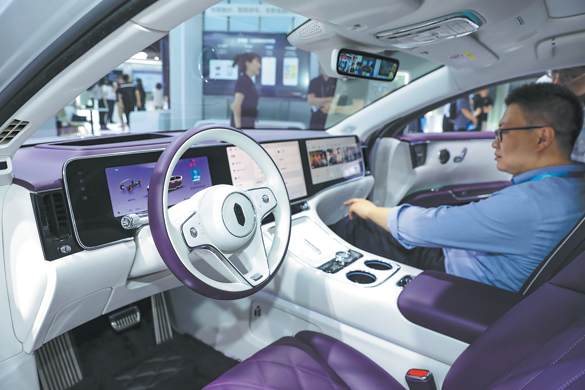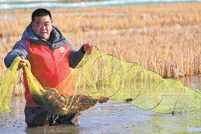Looking for a level playing field
Equality and equal opportunities are what the people with vision impairment need the most

The future lives in a cloud, formidable from a distance.
The cloud clears as you enter it.
Guo Wancheng, 25, keyed in this quote in Chinese on his desktop and explained where he got it from-West with the Night, a 1942 memoir by Beryl Markham-and how inspiring it is for him. He used to work as an editor for a WeChat public account, writing articles on how to get the latest information about postgraduate admissions. He is a voracious reader, quoting extensively from books he has read. He now works part time at Golden Cane, a Beijing-based program being run by the Soundwave Impairment Social Service Center that is aimed at training the visually impaired to acquire the skills necessary to lead normal lives.
He should know, for he is visually impaired himself. He was born with a critical eye condition and, despite a surgery, lost his eyesight by the time he was 10. However, that didn't stop him from completing his higher education, majoring in music from Beijing Union University, and getting an editing job soon after graduation.
Makeup without seeing face
Golden Cane is now organizing a 17-day training workshop for the visually impaired that started on Sept 10, Teachers' Day. They are imparting six courses in all, the first four dealing in improving visually impaired persons' working and living skills. By keying in the quote, Guo was showing how with the help of a screen-reading software, even visually impaired people can work on a desktop.
Pressing the Alt+Tab keys, he shuffled between different windows. Whenever he opened a new window, the software read the content on the page out loudly. "I can also type as fast as any other person," he said, before tapping away on the keyboard, keying in another quote. Meanwhile, Yang Yongquan, whose team developed this software, was teaching others to use it in the classroom.
At the workshop, the visually impaired are also being taught how to use smartphones, how to cook and how to apply makeup. They use the smartphones in the same manner they use computers, the screen-reading software helping them out.
Those attending the workshop had a lot to complain about in the cooking section. They said the cooking devices sold in the market are not that user-friendly. The rice cookers meant for the visually impaired just have Braille characters on the buttons; nobody bothered to take into account the actual constraints faced by the visually impaired. For example, some visually impaired persons wish the buttons were placed in such a way that their hands didn't get singed while using the cooker.
"Some enterprises make these utensils just for show," said a volunteer named Tiger.
In contrast, they were all laughing in the makeup section. Xiao Jia, visually impaired herself, was teaching them how to apply makeup on their faces, even though they cannot see themselves. "So what if we cannot see? We can still look good, can't we?" she asked.
Xiao lost her eyesight when she was 14. She then dropped out of school. After doing nothing for a while, she began learning how to apply makeup, inventing special techniques of applying it by touching certain points on the face. Now she can apply makeup on herself as well as on her customers.
"It is a good skill to acquire," she said.
There is a fifth course teaching the visually impaired how to walk outside independently, without depending on anybody. Golden Cane director Yang Qingfeng, who was born visually impaired himself, believes this course is more about building courage than about imparting any skills. "Many of the visually impaired people had never walked on their own until they met us," said Yang, with a sense of pride in what he was helping many achieve.
And then there is the psychological construction course, which is specifically for those who weren't born visually impaired but lost their eyesight at some point in life. "Compared with those born visually impaired, those who lose eyesight later in life find it hard to come to terms with it," said Yu Suyi, a staff member at Golden Cane. They generally hold sessions for these people to share their stories and offer them psychological counseling.
Courage first, skills later
Golden Cane director Yang was a journalist with 1+1 broadcast studio for the visually impaired in 2011. That is when he came up with the idea of opening a training center for the visually impaired.
"A middle-school student who came to study broadcasting in our studio was rather surprised to find that I went everywhere on my own, with just a walking stick in hand," Yang said. "Soon, he tried doing the same. A few months later, his mother called to say she was happy to see her son walking home alone with the help of the stick. So I thought, why not teach more visually impaired people to walk independently?"
There are those who ask why the visually impaired should at all step out without someone helping them. Yang has a firm answer: "We visually impaired people are not inferior to anyone. We, too, must live and enjoy life like any other person."
In January 2018, Yang and his newly launched program, Golden Cane, started a training camp for visually impaired people in Nanjing, capital of Jiangsu province. Surprisingly, they found that most of their trainees had already received training on how to walk using walking sticks, but having stayed in a closed environment for too long, they lacked the courage to venture out on their own.
"We helped them walk, not only physically, but also spiritually," Yang said. "There was technique to be taught, but we also taught them to be confident."
It was with this goal in mind that the organization began adding more courses for the visually impaired, such as cooking, makeup and computer skills. The schedules are tailor-made for each trainee, so that they learn at their own pace.
The organization also collaborated with other organizations. They applied for funding from the China Disabled Persons' Federation, while eye care agencies worked with them to create more awareness about eye health.
Tao Yong, head of Beijing Chaoyang Hospital's ophthalmology department, worked with them to help the visually impaired gain confidence. "I appreciate their efforts very much," Tao said. "They have provided hope where even modern medicine cannot help."
In the past three years, the organization has trained over a 100 visually impaired people. Over 70 percent of them can now go out on walks independently. Most of them can work. Yang is very happy with the results.
Jobs needed
The journey does not end with the visually impaired being able to walk, though. The ultimate goal is to help them live independently, for which a job is necessary.
For a long time, the only job the visually impaired could do was to become masseurs or masseuses, or, at best, open a massage parlor.
All that changed in 2014, when the National College Entrance Examination, or gaokao, introduced Braille test papers for the visually impaired.
Yang said that his trainees and friends now have a range of job options to choose from, such as software tester at R&D centers of smartphone companies, data processing for computer companies, and like Guo, even editing jobs.
In fact, these days they are able to play football, join 100-meters races, and sing. The Beijing Chaoyang Hospital's ophthalmology department head Tao is co-authoring a book of poems with Fang Huiwei, a 14-year-old visually impaired girl from Guilin city, southwestern China's Guangxi Zhuang autonomous region.
However, many organizations still desist from hiring visually impaired people, fearing they might run into trouble if such employees face some safety issues. Instead of employing the visually impaired people, some organizations prefer paying for the disabled employment security fund.
"Many people and organizations tend to treat the visually impaired as vulnerable groups needing help, but what they need is equal access to resources and equal opportunities," Yang said. "That's why we encourage them to go out of their homes independently. We hope to see the 17 million visually impaired people in China walk on the streets independently. Only when people see them as equal members of society will the visually impaired start getting equal opportunities."
Tao is working on a specialized eye health program called All See. "It might someday ensure visual impairment ceases to be a problem. But before that happens, let's get rid of the blindness in our hearts first," he said.




Today's Top News
- China to apply lower import tariff rates to unleash market potential
- China proves to be active and reliable mediator
- Three-party talks help to restore peace
- Huangyan coral reefs healthy, says report
- PLA conducts major drill near Taiwan
- Washington should realize its interference in Taiwan question is a recipe it won't want to eat: China Daily editorial






























